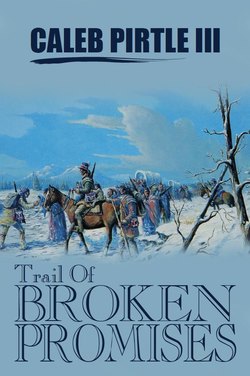Читать книгу Trail of Broken Promises - Caleb Pirtle III - Страница 11
На сайте Литреса книга снята с продажи.
Chapter 7: Play Ball!
ОглавлениеWHEN THE FRENCHMAN Bossu rode among the Choctaws in 1770, he discovered them playing ball – a recreational war practiced by most of the Five Civilized Tribes. His account may have been one of the first sports stories ever written on the North American continent:
The chactas are very active and very nimble. They have a game similar to our long racket game at which they are very skillful. The neighboring villages invite one another, inciting their opponents with a thousand words of defiance. Men and women gather in their finest costumes and pass the day singing and dancing . . . to the sound of the drum and rattle They agree upon a goal 60 paces distant and indicated by two large poles between which the ball must pass. Usually they play for 16 points. There are forty players on a side, each holding in his hand a racket two and a half feet long, of almost the same shape as ours, made of walnut or chestnut wood and covered with deer skin.
In the middle of the ball ground an old man throws up a ball made by rolling deer skin together. At once each player runs to try to catch the ball in his racket. It is a fine sight to observe the players with their bodies bare, painted in all sorts of colors, with a tiger tail fastened behind and feathers on their arms and heads which flutter as they run . . . They pus. They tumble over one another. He who is skillful enough to catch the ball sends it to the players on his side. Those on the opposite side run at the one who has seized it and return it to their own party, and they fight over it, party against party, with so much vigor that shoulders are sometime dislocated. The players never become angry . . . The wagers are considerable; the women bet against one another.
After the players have finished, the women whose husbands have lost assemble to avenge them. The racket which the women use differs from that of the men in being bent. They play with much skill. They run against one another very swiftly and shove one another like the men, being equally naked except for the parts which modesty dictates they shall cover. They merely redden their cheeks, using vermilion on their hair instead of powder.
H. B. Cushman, the missionary, would later write:
An ancient Choctaw ball play would be an exhibition far more interesting, strange, wild and romantic, in all its features, than anything ever exhibited in a circus . . . excelling it in every particular of daring feats and wild recklessness s. . . The activity, fleetness, strength and endurance of the Mississippi Choctaw warrior and hunter, were more fully exemplified than anywhere else; for there he brought into the most severe action every power of soul and body. In those ancient ball plays, I have known villages to lose all their earthly possessions upon the issue of a single play.
